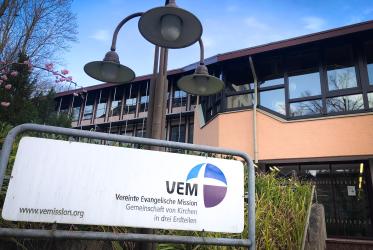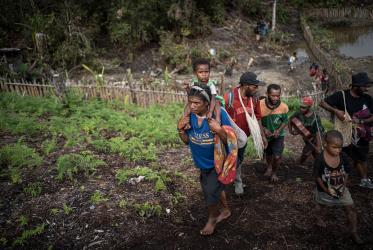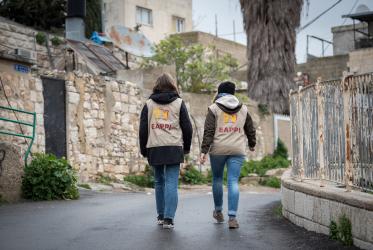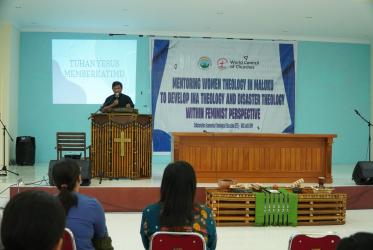For the past 26 years, the global water community is gathering in Stockholm for a week in August or September, at the World Water Week, organised by the Stockholm International Water Institute (SIWI), to discuss the importance of water for human development and a sustainable planet. Call it a coincidence: just one year before the first World Water Week, September 1st was proclaimed as a day of prayer for the environment by the late Ecumenical Patriarch Dimitrios I in 1989.
Every year about 3000 participants from various sectors related to water representing the scientific community, United Nations bodies, corporate sectors, civil society organisations, students and others, participate in the World Water Week. It is a great opportunity to learn about new innovations in technology, community initiatives, good practices on water management and the human right to water. It is also a great platform to build networks and partnerships among like-minded people and organisations engaged in the water sector.
Because of its timing in late summer, it is a good time to discuss and influence decisions and policies related to water that may require action by the UN Human Rights Council fall session in Geneva and the UN General Assembly in New York - both in September every year.
For some reason, in the past, faith communities, even though engaged in the water sector, were barely present at the World Water Week. When I attended the event last year, representing the WCC, I could hardly find any other ecumenical organisations or Faith Based Organisations (FBOs), even though many of them are key actors on water sectors.
Every other participant I met, they would look at my name card and seeing World Council of Churches, would ask “what has the church to do with water”? “What brings you to this event”? And I would have to explain from scratch what WCC is doing on water and the contribution of faith communities in this field. Evidently, many participants had not heard of what the churches or FBOs are doing on humanitarian aid and development in general and on water in particular. Having worked in ecumenical organisations for almost two decades, having attended dozens of ecumenical seminars and conferences, all of a sudden I felt like a stranger in this large crowd of around 3000 participants.
This year’s Word Water Week was a bit different, though. Probably for the first time the organisers had included in the official programme discussions on the role of FBOs in contributing to the achievement of the Sustainable Development Goals (SDGs), particularly on water.
The SIWI identified “Water and Faith” as a new trend in the WWW discourses. On its website, it said, “Water has profound symbolic meaning in many religious and local traditions and water stress is particularly acute in many parts of the world in which faith is a central aspect of individual and community identity.”
It added, “However, development is not only about policies and investments, it is also about behaviour change and cultural values. In that respect, how can Faith Based Organizations (FBOs) contribute to the achievement of the SDGs?”
To emphasise the contribution of FBOs in addressing the SDGs related to water, the SIWI invited Cardinal Peter Turkson, a prominent Roman Catholic leader who heads the Pontifical Council for Justice and Peace and will preside over the new Dicastery for Promoting Integral Human Development from January, to be a speaker at the opening plenary.
Cardinal Turkson drew the attention of the participants from 120 countries to the contribution of FBOs to human development with dignity, saying: “development can’t be reduced to resources, investments and finances. At the centre of development is a human person. And in catholic social teaching, we say that development is a vocation of the human person. Therefore faith-based groups have a primary role to play in development, in all dimensions and in all areas.”
He also referred to Pope Francis' ground-breaking encyclical Laudato Si’ (Care of our common home) and the World Day of Prayer for Creation, which incidentally was observed during the World Water Week, on 1 September. Since 2008, from 1 September to 4 October, WCC member churches observe the Time for Creation. Last year, Pope Francis declared 1 September as World Day of Prayer for Creation and asked Catholics to join with Orthodox and Protestants to celebrate and pray for Creation during these five weeks.
Subsequently in a special WWW event on Faith and Water, an interfaith panel discussed the spiritual significance of water in their religions and how they are engaged in water issues at the grassroots level. Cardinal Turkson gave the keynote; I represented the WCC and its Ecumenical Water Network.
Our message to the global water community: the faith communities realise that water is vital for the very survival of Creation, and we strongly believe that water is a gift of God, a public good and a human right.
I also reminded the participants about the WCC's appeal to its member churches to eliminate bottled water from Europe and North America, as bottled water becomes an impediment to the realisation of the human right to water. In this season of creation, WCC has reiterated its call to implement the elimination of bottled water.
It is important that we discuss water for all and sustainable management of water resources. Within the United Nations, recently, the human right to water has been discussed widely. However, we must not forget that the whole Creation is dependent on water and we must also focus on water for a sustainable eco-system.







